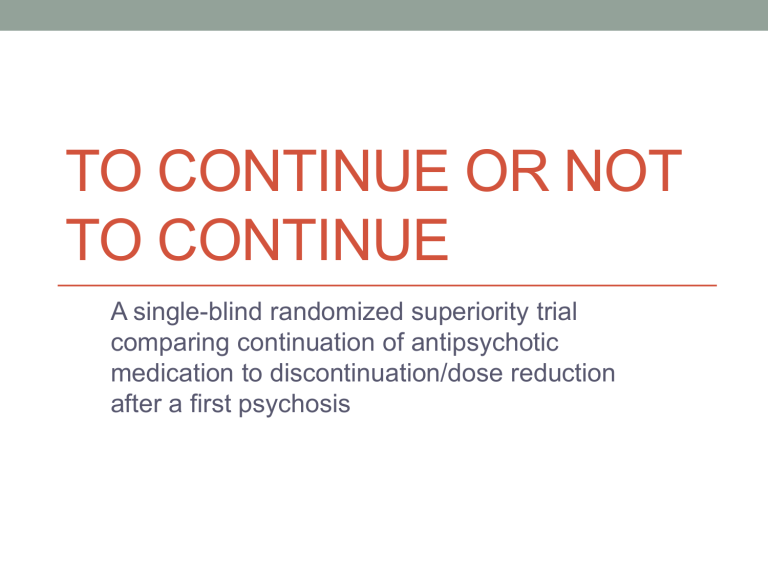
TO CONTINUE OR NOT
TO CONTINUE
A single-blind randomized superiority trial
comparing continuation of antipsychotic
medication to discontinuation/dose reduction
after a first psychosis
What we know
• Antipsychotic medication is effective to treat psychosis
• Antipsychotic medication after remission of psychosis
reduces relapse and re-hospitalisation
• Antipsychotic medication has negative effects on motivation,
learning ability and mood
• Many patients discontinue medication despite doctors advise
to continue
What we need to know
• Is social recovery better if antipsychotic medication is
gradually tapered of at an early stage as compared to
continuation (TAU)?
• Which personal and treatment factors predict successful
discontinuation of medication?
• What is the cost-utility of discontinuation compared to
continuation?
• Can we implement the optimal strategy during the trial?
Pragmatic single-blind Superiority Trial
• 512 patients 3-6 months in remission after first psychosis
randomized 1:1 to:
- continuation antipsychotic medication ≥ 1 year (TAU) or
- gradual discontinuation antipsychotic medication
•Intention to treat with minimal exclusion criteria
Outcome measures
Assessed by a trained rater blind to condition
Primary:
• WHODAS ability scale (selected by patients)
Secondary
• Subjective wellbeing and QoL
• EMA: mood, anxiety, sleep and paranoia
• Severity of symptoms, relapse rate, hospitalisation and
service use
• Aggression incidents and suicidal acts
• Side effects, metabolic syndrome and physical health
Work Package leaders
• WP 1 superiority trial n=512 Iris Sommer UMCU and
Lieuwe de Haan AMC
• WP 2 ecological momentary assessments Wim Veling
UMCG and Jim van Os UMCM
• WP 3 cost-utility and prognostic modelling Filip Smit
Trimbos/VUmc and Mark vd Gaag Parnassia/VU
• WP 4 Implementation Michel Wensing Heidelberg
Psychosis Consortium
www.psychoseconsortium.nl
Centers and PIs
• GGZ NHN S Veerman
• GGZ Rivierduinen
•
•
•
•
•
•
•
JP Selten (2 teams)
Arkin M Kikkert (2 teams)
GGZ Ingeest
A Steenhoven (2 teams)
Altrecht T Starink
GGZ Centraal
R. Bakker (2 teams)
Reinier van Arkel
K Grootes
GGZ E M Marcelis
(2 teams)
Mondriaan T v Amelsvoort
• Lentis R Knegtering
(2 teams)
• GGZ Friesland
L Wunderink
• UMCG W Veling
• AMC L de Haan
• UMCU I Sommer
• GGZ Delfland N Veen
• GGZ Delta N v Beveren
• Yulius A v Gool
• UzA J Luykx
• Parnassia
M vd Gaag (4 teams)
• MUMC J v Os
Psychosis Consortium plus Rescue Centers
Organization
GA: PIs from all centers
plus Anoiksis
General
assembly
EB: WP leaders plus
Anoiksis
Executive
board
IAB: ECNP plus
European patients
associations
WPs: topic leaders
WPs
Independent
advisory
board
Project
office
Timelines
• Inclusion 2017-2019 in 26 teams, 5-10 per team annually
• Interim analyses for safety and implementation after 1 and 3
years
• Follow-up of 4 years, annual analyses of recovery, secondary
outcomes and HTA
Publication and Implementation Results
• All contributing partners publish on primary and secondary
study outcomes of all WPs
• Proposals for tertiary papers can be made by all
contributing partners during the study and are discussed in
GA during annual meetings
• All centers report on speed and completeness of
implementation and share optimal strategies
Deliverables
• WP1: social, personal and medical benefits of continuation or
discontinuation short and long-term.
• Clear guidelines, congruent policy across centers, clear information
for patients.
• Primum nil nocere
• WP2: eHealth monitor for early prediction of relapse
• WP3: optimal cost-effective strategy for remitted patients,
• individual prediction of successful discontinuation,
• determination of optimal treatment to achieve social recovery
• WP4: early and effective implementation of results



